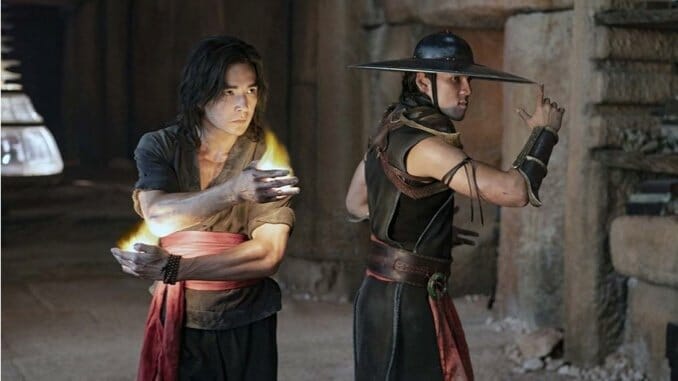Mortal Kombat Is the Most Asian the Property Has Ever Been
It still isn’t the breakout videogame movie success it hoped to be, though.

Beware of spoilers for Mortal Kombat. Be sure to read Paste’s full review by Jacob Oller.
When Mortal Kombat, the 1992 videogame and moral panic katalyst, first hit arcades, it was notable mostly for the absurd gore and brutality and the story a bit less so: You pick a fighter and smack around the other colorful kombatants for a shot at saving Earthrealm from the insidious shapeshifting sorcerer Shang Tsung. The story had a measure of Shaw Brothers-style window dressing to it, but you were really there to see Sub Zero rip a dude’s spine out.
Mortal Kombat is one of the videogame franchises that actually has a very deep catalog of film and TV adaptations: Numerous animated films, an animated TV show, a (very bad) live action show, and the two other theatrical live action films from 1995 (fuckin’ rules) and 1997 (fuckin’ sucks) are just a start. What’s striking when you hold up the newest movie to all of these other adaptations is just how much more Asian it is, something you wouldn’t think would be so surprising in a series based on ice ninjas and Japanese thunder gods.

How an adaptation handles stuff like the character designs tells you a lot about it, and so it’s fitting that even Scorpion’s signature rope dart—the cool chain-spear that he uses to GET his opponents OVER HERE—reflects what’s different. In the movie, it’s a kunai, which ninja movies and anime love to portray as a sort of throwing weapon. Historians have documented its use in Japan as a gardening tool—the story goes that shinobi used it as an improvised weapon. And that’s how Scorpion comes by it in the first scene, grabbing it up in a moment of desperation before he’s rushed by a ton of ninjas.
There are plenty of other much more noticeable changes: The ninja who will become the undead revenant Scorpion (Hiroyuki Sanada) is actually an honest-to-goodness shinobi during the Edo Period. His idyllic family life is, of course, doomed to violent murder inside the first five minutes of the movie. His nemesis, Sub Zero (Joe Taslim), shows up, kills everybody, and the two fight to the death—Scorpion’s death, as fans of the game can see coming.
In a move that’s nearly a first for the franchise, this live-action adaptation actually casts Asians to play the two rivals. In the other live-action portrayals, only Mortal Kombat: Annihilation featured an actor of Asian descent portraying Sub Zero or Scorpion, whose backstories have always explicitly stated that they are Chinese and Japanese, respectively.
And thankfully, the movie lets Sanada and Taslim—two actors with plenty of badass movie bona fides that I hope the audience will be inspired to familiarize themselves with—face off against one another speaking entirely in subtitled Japanese and Chinese. I watched it on HBO Max, and the subtitles the streaming service provided even specified which language they were speaking: Sub Zero slips in between Chinese and Japanese, and it adds nuance to scenes where he menaces Scorpion’s terrified family or insults Scorpion in a language the ninja doesn’t understand. It is smart, it is intentional, it is true to these 30-year-old characters (god, I’m old) and it treats its audience like adults who won’t tune out because they need to read subtitles.
After their deadly bout, the movie introduces us to another first: an Asian in the role of Raiden (Tadanobu Asano, another veteran of Japanese productions). This is something the damn videogames haven’t done, even in the last two heavily performance-captured entries. You wonder why it took so long to get a Japanese actor to play this Japanese thunder god. (I’m kidding. I don’t wonder.)
-

-

-

-

-

-

-

-

-

-

-

-

-

-

-

-

-

-

-

-

-

-

-

-

-

-

-

-

-

-

-

-

-

-

-

-

-

-

-

-










































